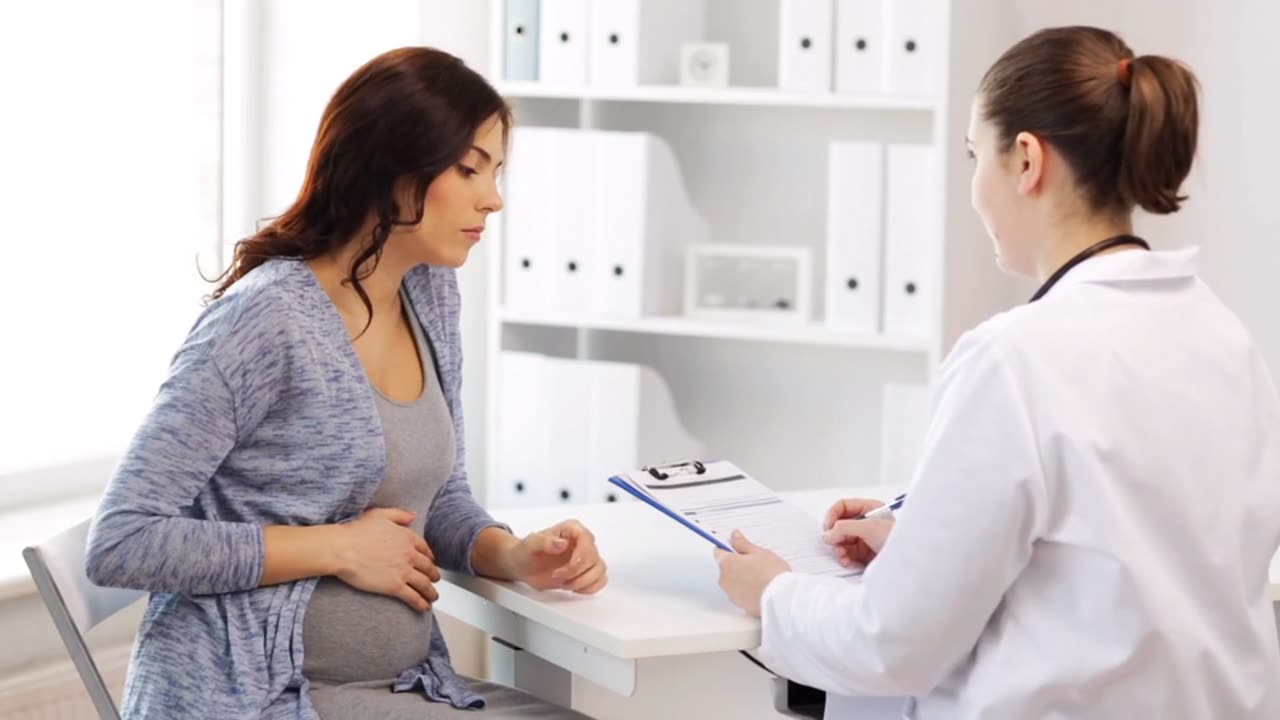Premium Only Content

Increased Risk of Severe Illness
Increased Risk of Severe Illness
close up of pregnant person belly
If you are pregnant or were recently pregnant, you are more likely to get severely ill from COVID-19 compared to people who are not pregnant. Pregnancy causes changes in the body that could make it easier to get very sick from respiratory viruses like the one that causes COVID-19. These changes in the body can continue after pregnancy.
Severe illness means that a person with COVID-19 may need:
Hospitalization
Admission into an intensive care unit (ICU)
A ventilator or special equipment to help them breathe
People with COVID-19 who become severely ill can die. See why pregnancy is included in the list of underlying medical conditions that increase a person’s risk of severe illness from
Certain factors can increase risk
Other factors can further increase the risk for getting very sick from COVID-19 during or recently after pregnancy, such as:
Having certain underlying medical conditions
Being age 25 years or older
Living or working in a community with high numbers of COVID-19 cases
Living or working in a community with low levels of COVID-19 vaccination
Working in places where it is difficult or not possible to avoid contact with people who might be sick with COVID-19
Being part of some racial and ethnic minority groups, which have been put at increased risk of getting sick from COVID-19 because of the health inequities they face
Effect on Pregnancy Outcomes
People with COVID-19 during pregnancy are more likely to experience complications that can affect their pregnancy and developing baby compared to people without COVID-19 during pregnancy. For example, COVID-19 during pregnancy increases the risk of delivering a preterm (earlier than 37 weeks) or stillborn infant. People with COVID-19 during pregnancy may also be more likely to have other pregnancy complications.
Staying Healthy During and After Your Pregnancy
Keep all of your healthcare appointments during and after pregnancy. Visit with your healthcare provider for all recommended appointments. If you’re concerned about going to your appointments in person because of COVID-19, ask your healthcare professional what steps they are taking to protect patients from COVID-19, or ask about telemedicine options. If you need help finding a healthcare professional, contact your nearest hospital, clinic, community health center, or health department.
Talk to your healthcare professional about how to stay healthy and take care of yourself and the baby.
Ask any questions you have about the best place to deliver your baby. Delivering a baby is always safest under the care of trained healthcare professionals.
You should also talk to your healthcare professional if you think you are experiencing depression during or after pregnancy.
Get recommended vaccines during pregnancy. These vaccines can help protect you and your baby.
Get a flu vaccine every year. Others living in your household should also get vaccinated to protect themselves and you.
Get the Tdap vaccine to protect your baby against whooping cough, which can have similar symptoms to COVID-19. CDC recommends all pregnant people receive a Tdap vaccine during each pregnancy. In addition, everyone who is around the baby should be up to date with their whooping cough vaccine.
Call your healthcare professional if you have any concerns about your pregnancy, if you get sick, or if you think that you may have COVID-19.
Do not delay getting emergency care because of worries about getting COVID-19. Emergency departments have steps in place to protect you from getting COVID-19 if you need medical care.
If you need emergency help, call 911 right away. If someone else is driving you to the emergency department, call the emergency facility while you are on the way. If you must drive yourself, call before you start driving.
Tell them that you are pregnant or were recently pregnant and are having an emergency.
Seek medical care immediately if you experience any urgent maternal warning signs and symptoms (for example, headache that won’t go away, dizziness, fever, severe swelling of hand, face, arm or leg, trouble breathing, chest pain or fast-beating heart, severe nausea and throwing up, or vaginal bleeding or discharge during or after pregnancy). These symptoms could indicate a potentially life-threatening complication.
-
 LIVE
LIVE
Russell Brand
43 minutes agoBREAK BREAD EP. 15 - LECRAE
1,514 watching -
 LIVE
LIVE
Viss
4 hours ago🔴LIVE - Precision Guided & Strategic PUBG Tactics!
433 watching -
 1:06:58
1:06:58
The White House
2 hours agoPress Secretary Karoline Leavitt Briefs Members of the Media, Feb. 25, 2025
9.44K7 -
 1:34:46
1:34:46
Russell Brand
2 hours agoControl Slipping: Germany’s Vote, Ukraine, Apple, and Joy Reid – SF543
54.4K13 -
 57:44
57:44
Winston Marshall
2 hours ago“They Were Hiding THIS!” Michael Shellenberger UNCOVERS Dark Secret About USAID and The Deep State
12K11 -
 50:59
50:59
Michael Franzese
1 day agoAmerica’s Biggest Issues EXPOSED by Tomi Lahren
19.9K10 -
 LIVE
LIVE
The Dana Show with Dana Loesch
2 hours agoDOGE LAYOFFS FACE BACKLASH | The Dana Show LIVE On Rumble!
588 watching -
 1:25:40
1:25:40
Bare Knuckle Fighting Championship
1 day agoThe Bare Knuckle Show with Brian Soscia
5.91K -

TheAlecLaceShow
3 hours agoDan Bongino Joins Kash Patel at FBI | Vivek For Ohio | Where’s the Epstein List | The Alec Lace Show
2.43K2 -
 55:46
55:46
The Dan Bongino Show
5 hours agoChange Is Coming, And All The Right People Are Panicking (Ep. 2430) - 02/25/2025
785K2.02K